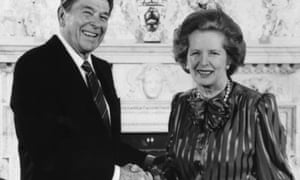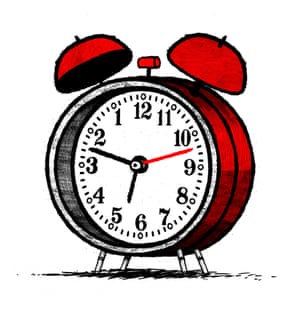The events that led to Donald Trump’s election started in England in 1975. At a meeting a few months after Margaret Thatcher became leader of the Conservative party, one of her colleagues, or so the story goes, was explaining what he saw as the core beliefs of conservatism. She snapped open her handbag, pulled out a dog-eared book, and slammed it on the table. “This is what we believe,” she said. A political revolution that would sweep the world had begun.
The book was The Constitution of Liberty by Frederick Hayek. Its publication, in 1960, marked the transition from an honest, if extreme, philosophy to an outright racket. The philosophy was called neoliberalism. It saw competition as the defining characteristic of human relations. The market would discover a natural hierarchy of winners and losers, creating a more efficient system than could ever be devised through planning or by design. Anything that impeded this process, such as significant tax, regulation, trade union activity or state provision, was counter-productive. Unrestricted entrepreneurs would create the wealth that would trickle down to everyone.
This, at any rate, is how it was originally conceived. But by the time Hayek came to write The Constitution of Liberty, the network of lobbyists and thinkers he had founded was being lavishly funded by multimillionaires who saw the doctrine as a means of defending themselves against democracy. Not every aspect of the neoliberal programme advanced their interests. Hayek, it seems, set out to close the gap.
He begins the book by advancing the narrowest possible conception of liberty: an absence of coercion. He rejects such notions as political freedom, universal rights, human equality and the distribution of wealth, all of which, by restricting the behaviour of the wealthy and powerful, intrude on the absolute freedom from coercion he demands.
Democracy, by contrast, “is not an ultimate or absolute value”. In fact, liberty depends on preventing the majority from exercising choice over the direction that politics and society might take.
He justifies this position by creating a heroic narrative of extreme wealth. He conflates the economic elite, spending their money in new ways, with philosophical and scientific pioneers. Just as the political philosopher should be free to think the unthinkable, so the very rich should be free to do the undoable, without constraint by public interest or public opinion.
The ultra rich are “scouts”, “experimenting with new styles of living”, who blaze the trails that the rest of society will follow. The progress of society depends on the liberty of these “independents” to gain as much money as they want and spend it how they wish. All that is good and useful, therefore, arises from inequality. There should be no connection between merit and reward, no distinction made between earned and unearned income, and no limit to the rents they can charge.
Inherited wealth is more socially useful than earned wealth: “the idle rich”, who don’t have to work for their money, can devote themselves to influencing “fields of thought and opinion, of tastes and beliefs.” Even when they seem to be spending money on nothing but “aimless display”, they are in fact acting as society’s vanguard.
Hayek softened his opposition to monopolies and hardened his opposition to trade unions. He lambasted progressive taxation and attempts by the state to raise the general welfare of citizens. He insisted that there is “an overwhelming case against a free health service for all” and dismissed the conservation of natural resources.It should come as no surprise to those who follow such matters that he was awarded the Nobel prize for economics.
By the time Mrs Thatcher slammed his book on the table, a lively network of thinktanks, lobbyists and academics promoting Hayek’s doctrines had been established on both sides of the Atlantic, abundantly financed by some of the world’s richest people and businesses, including DuPont, General Electric, the Coors brewing company, Charles Koch, Richard Mellon Scaife, Lawrence Fertig, the William Volker Fund and the Earhart Foundation. Using psychology and linguistics to brilliant effect, the thinkers these people sponsored found the words and arguments required to turn Hayek’s anthem to the elite into a plausible political programme.

The ideologies Margaret Thatcher and Ronald Reagan espoused were just two facets of neoliberalism. Photograph: Bettmann/Bettmann Archive
Thatcherism and Reaganism were not ideologies in their own right: they were just two faces of neoliberalism. Their massive tax cuts for the rich, crushing of trade unions, reduction in public housing, deregulation, privatisation, outsourcing and competition in public services were all proposed by Hayek and his disciples. But the real triumph of this network was not its capture of the right, but its colonisation of parties that once stood for everything Hayek detested.
Bill Clinton and Tony Blair did not possess a narrative of their own. Rather than develop a new political story, they thought it was sufficient to triangulate. In other words, they extracted a few elements of what their parties had once believed, mixed them with elements of what their opponents believed, and developed from this unlikely combination a “third way”.
It was inevitable that the blazing, insurrectionary confidence of neoliberalism would exert a stronger gravitational pull than the dying star of social democracy. Hayek’s triumph could be witnessed everywhere from Blair’s expansion of the private finance initiative to Clinton’s repeal of the Glass-Steagal Act, which had regulated the financial sector. For all his grace and touch, Barack Obama, who didn’t possess a narrative either (except “hope”), was slowly reeled in by those who owned the means of persuasion.
As I warned in April, the result is first disempowerment then disenfranchisement. If the dominant ideology stops governments from changing social outcomes, they can no longer respond to the needs of the electorate. Politics becomes irrelevant to people’s lives; debate is reduced to the jabber of a remote elite. The disenfranchised turn instead to a virulent anti-politics in which facts and arguments are replaced by slogans, symbols and sensation. The man who sank Hillary Clinton’s bid for the presidency was not Donald Trump. It was her husband.
The paradoxical result is that the backlash against neoliberalism’s crushing of political choice has elevated just the kind of man that Hayek worshipped. Trump, who has no coherent politics, is not a classic neoliberal. But he is the perfect representation of Hayek’s “independent”; the beneficiary of inherited wealth, unconstrained by common morality, whose gross predilections strike a new path that others may follow. The neoliberal thinktankers are now swarming round this hollow man, this empty vessel waiting to be filled by those who know what they want. The likely result is the demolition of our remaining decencies, beginning with the agreement to limit global warming.
Those who tell the stories run the world. Politics has failed through a lack of competing narratives. The key task now is to tell a new story of what it is to be a human in the 21st century. It must be as appealing to some who have voted for Trump and Ukip as it is to the supporters of Clinton, Bernie Sanders or Jeremy Corbyn.
A few of us have been working on this, and can discern what may be the beginning of a story. It’s too early to say much yet, but at its core is the recognition that – as modern psychology and neuroscience make abundantly clear – human beings, by comparison with any other animals, are both remarkably social and remarkably unselfish. The atomisation and self-interested behaviour neoliberalism promotes run counter to much of what comprises human nature.
Hayek told us who we are, and he was wrong. Our first step is to reclaim our humanity.

